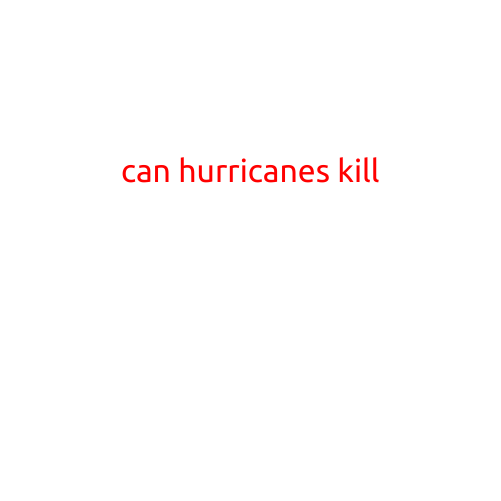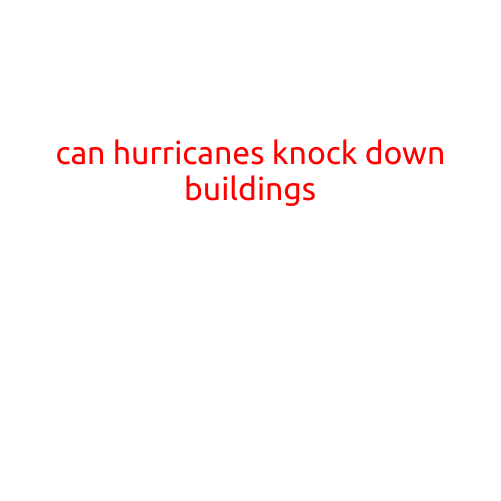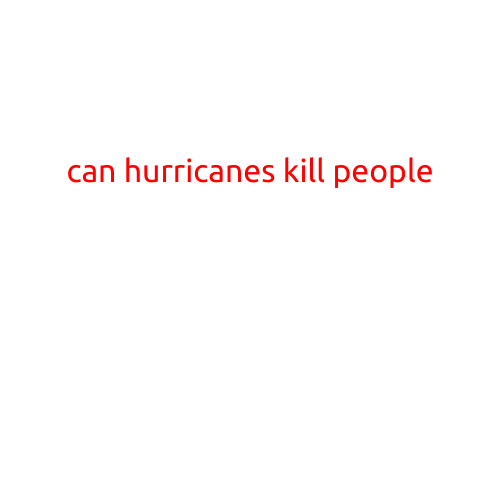
Can Hurricanes Kill? Yes, and Here’s How
Hurricanes are powerful storms that can bring destruction and devastation to communities worldwide. While they can cause significant property damage and disrupt daily life, hurricanes can also be deadly. In fact, hurricanes are responsible for thousands of deaths each year, making them one of the deadliest types of natural disasters.
How Hurricanes Kill
Hurricanes can kill through various means, including:
- Storm Surge: A storm surge is a rise in sea level due to the storm’s winds and low atmospheric pressure. This can cause flooding in coastal areas, leading to drowning and damage to infrastructure.
- Flooding: Hurricanes can bring heavy rainfall, leading to flash flooding, landslides, and mudslides. This can trap people in their homes and vehicles, making them vulnerable to drowning and other hazards.
- Strong Winds: Sustained winds of over 74 mph (119 km/h) can cause damage to buildings, bridges, and power lines. Trees can be uprooted, causing widespread destruction and blocking evacuation routes.
- Tornadoes: Hurricanes can also spawn tornadoes, which can cause additional damage and loss of life.
- Lightning: Hurricanes can produce lightning strikes, which can be deadly to people outdoors and in poorly designed structures.
- Food and Water Deprivation: After a hurricane, it’s common for basic necessities like food and water to be scarce. This can lead to dehydration, malnutrition, and even death.
Statistics on Hurricane-Related Fatalities
According to the National Hurricane Center (NHC), the United States averages approximately 85 hurricane-related deaths per year. However, this number can vary significantly from year to year, depending on the strength and affected area of the hurricane.
Some notable examples of hurricane-related fatalities include:
- Hurricane Katrina (2005): 1,800 deaths in the United States and thousands more in other countries affected by the storm.
- Hurricane Mitch (1998): 11,000 deaths in Central America.
- Hurricane Maria (2017): 3,000 deaths in Puerto Rico.
Preventing Hurricane-Related Fatalities
While hurricanes can be unpredictable, there are steps you can take to prepare and reduce the risk of injury or death:
- Stay Informed: Pay attention to weather forecasts and warnings issued by local authorities.
- Create a Plan: Establish a plan for evacuation, communication, and emergency contact in case of a hurricane.
- Secure Your Home: Board up windows, secure outdoor furniture and decorations, and trim trees and shrubs to minimize damage.
- Stock an Emergency Kit: Keep a kit with essential items like food, water, first aid supplies, and a battery-powered radio.
- Follow Evacuation Orders: If told to evacuate, do so promptly to avoid danger zones and ensure safe shelter.
Conclusion
Hurricanes are powerful forces of nature that can cause significant harm and loss of life. By understanding the risks and taking steps to prepare, you can help keep yourself and your loved ones safe during a hurricane. Remember to stay informed, create a plan, secure your home, stock an emergency kit, and follow evacuation orders to minimize the risk of hurricane-related fatalities.





